Watermelon is a summer staple that many people look forward to. It’s juicy, sweet, and refreshing, making it the perfect snack on a hot day. However, there has always been one part of the fruit that many of us were taught not to eat: The seeds. We were told at least once in our lives that if we did, they would sprout and grow a watermelon in our stomachs. At the very least, there seemed to be this thought that the seeds weren’t safe to eat. But did you know that the seeds are actually highly nutritious? Here are some reasons why you should add watermelon seeds to your diet.
Delicious Reasons To Eat Watermelon Seeds

Watermelon has been a prized fruit for hundreds of years. Though today we tend to just eat the fruit’s red flesh, different cultures consumed other parts of the fruit in the past. The seeds, in particular, have been eaten for centuries for their tasteful crunch and nutritional benefits. Due to their bitter outer shell, they are usually eaten roasted, not unlike how we roast pumpkin seeds in the fall. These are some of the top reasons to start eating watermelon seeds. (1)
Read More: Use This Guide To Know When Fruit and Vegetables Are In Season To Save Money
Nutritious

Watermelon seeds are packed with nutrients. They are a good source of protein, healthy fats, fiber, and minerals such as magnesium, potassium, and zinc. These nutrients are essential for maintaining good health and preventing diseases. (2)
- Protein: Watermelon seeds are a good source of vegetable-based protein. Protein is an essential macronutrient that’s needed for tissue growth and repair, making it especially important for active individuals. It also helps boost metabolism and maintain a healthy weight by keeping you feeling full longer.
- Healthy Fats: Watermelon seeds are an excellent source of healthy fats. The fats in watermelon seeds come from their fatty acids, which are essential for maintaining good health. They’re also a great source of omega-3 fatty acids, which have been shown to reduce inflammation and help lower blood pressure.
- Magnesium: Watermelon seeds are a great source of magnesium, which helps boost energy levels and keep your metabolism running smoothly. Magnesium also plays an important role in the function of over 300 different enzymes in the body, making it especially critical for our health.
- Potassium: Potassium is another important mineral that helps regulate fluid balance in the body. It also helps lower blood pressure and reduce the risk of heart disease and stroke by preventing plaque buildup in arteries.
- Zinc: Zinc is an essential mineral that plays an important role in the production of insulin, which helps regulate blood sugar. It also supports immune system function and keeps your skin healthy.
- Fiber: Watermelon seeds are a good source of fiber, which helps prevent constipation by adding bulk to your stool. Fiber can also help lower cholesterol levels by preventing bile acids from being reabsorbed by the body.
The seeds are a great source of natural antioxidants, which help to neutralize free radicals in the body. They also contain phytonutrients that help prevent inflammation and improve blood circulation.
Low in Calories

If you’re watching your weight, watermelon seeds are a great snack option. They are low in calories and can help you feel full for longer. A 1oz serving of watermelon seeds contains only 158 calories.
Versatile

Watermelon seeds are versatile and can be used in many ways. You can roast them, add them to salads, or use them as a topping for yogurt or oatmeal. You can also grind them into a watermelon seeds butter and use it as an alternative to peanut butter. (3)
Good for Your Skin

Watermelon seeds are rich in antioxidants, which are good for your skin. Antioxidants help protect your skin from damage caused by free radicals, which can lead to premature aging and skin cancer.
Boosts Immune System

Watermelon seeds are an excellent source of vitamin C, which is essential for a healthy immune system. Vitamin C helps your body produce white blood cells, which fight off infections and diseases.
Read More: This Fruit May Help Prevent Fragility in Old Age, Study Says
Improves Heart Health

Watermelon seeds are rich in healthy fats, which can help improve your heart health. These fats can help lower your cholesterol levels and reduce your risk of heart disease.
The Bottom Line

Watermelon seeds are a nutritious and delicious snack that you should add to your diet. They are low in calories, versatile, and packed with nutrients that are good for your health. So, the next time you eat a watermelon, don’t throw away the seeds. Roast them, add them to your favorite dish, or eat them as a snack. Your body will thank you for it.
Read More: 8 Gardening Hacks That Will Help Flowers, Veggies, And Fruit Flourish
Sources
- “The 5,000-Year Secret History of the Watermelon.” National Geographic. Mark Strauss. August 21, 2015.
- “Seeds, watermelon seed kernels, dried.” FDC
- “Is It Safe to Eat Watermelon Seeds?” Prevention. Korin Miller. May 15, 2021.

